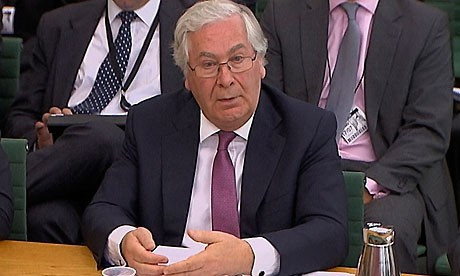BoE's Mervyn King: Government's RBS Strategy 'Nonsense'

Bank of England governor Mervyn King has attacked the government's handling of bailed-out RBS, describing its arm's-length approach as "nonsense".
At a banking standards commission hearing, King said RBS, which is 82 percent owned by the taxpayer after its near collapse in during the financial crisis forced the government to step in, must be split into two parts – a healthy side which would support lending into the economy, and another which would hold its bad assets.
"The arguments for restructuring sooner rather than later are powerful ones," King said, adding that the government and RBS should "face up to its losses" and that the bank could be returned to the private sector within a year if it followed his advice.
He said Stephen Hester, the RBS chief executive, was doing a good job in reducing the size of the balance sheet, but that under this strategy it could be at least two years before RBS leaves government hands.
"The question is whether that's soon enough to get RBS back into the position where it's lending into the UK economy," he said.
Chancellor George Osborne told the commission at a recent hearing that it would be politically impossible to advocate the government stepping in and taking full control of RBS.
Osborne said it would costs billions of pounds at a time of public sector austerity and people would not accept the inevitable increase in the Treasury's debt pile that this would cause.
EU bonus cap
However, on the issue of the EU's proposed cap on bank bonuses King, whose reign as governor will end in June, shared common ground with Osborne.
Under new EU plans, bank bonuses would be limited to a value capped at the individual's annual salary. This could be increased to double that amount, subject to shareholder approval.
The new rules look set to be approved by a majority of the EU's 27 member states, but the UK has expressed fears that it would hurt London's position as the financial capital of the world.
Osborne and other critics have also said that it would simply lead to higher base salaries, which would be impossible to claw back later on if poor performance or malpractice was discovered, which is possible with bonus payments that are often deferred.
There is also flexibility for a bank in making up its remuneration package with bonus payments, as the pool can be reduced in difficult times to cut costs in a way that cannot be done with salaries unless there are layoffs.
King said that the EU bonus cap is "a distraction" and would be much less effective in practice than its proponents think.
He said that the system should make sure people who take profits also absorb the losses and "the incentives will sort out themselves".
© Copyright IBTimes 2024. All rights reserved.







